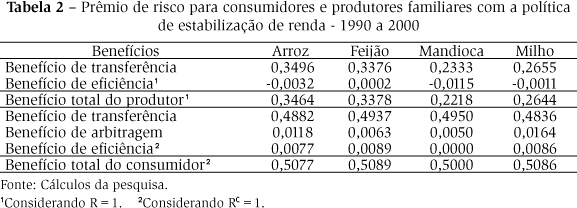Income transfers from family farm to nonagricultural sectors occurred due to imports to substitution policy. A way of compensating this segment could be set by an income stabilization policy that would improve the income distribution in the agricultural sector. Also it could assure a stable profitability to farmers. The objective of this paper is to determine the benefits of an income stabilization policy implemented to the family farms producing rice, beans, corn and cassava. The research also aims to determine the costs of this policy for commercial farmers. The methodology applies the Newbery and Stiglitz model, that consider the risk reduction with the income stabilization policy. This policy would increase the family farmers' income. The transfer benefits would exceed the efficiency benefits for family farmers and consumers. The benefits for the family farm would be larger than the costs for the commercial farm in the beans, cassava and corn markets. The benefits with this policy would overcome the costs in the beans and corn markets, but not in the rice and cassava markets.
income stabilization policy; family farm; risk













